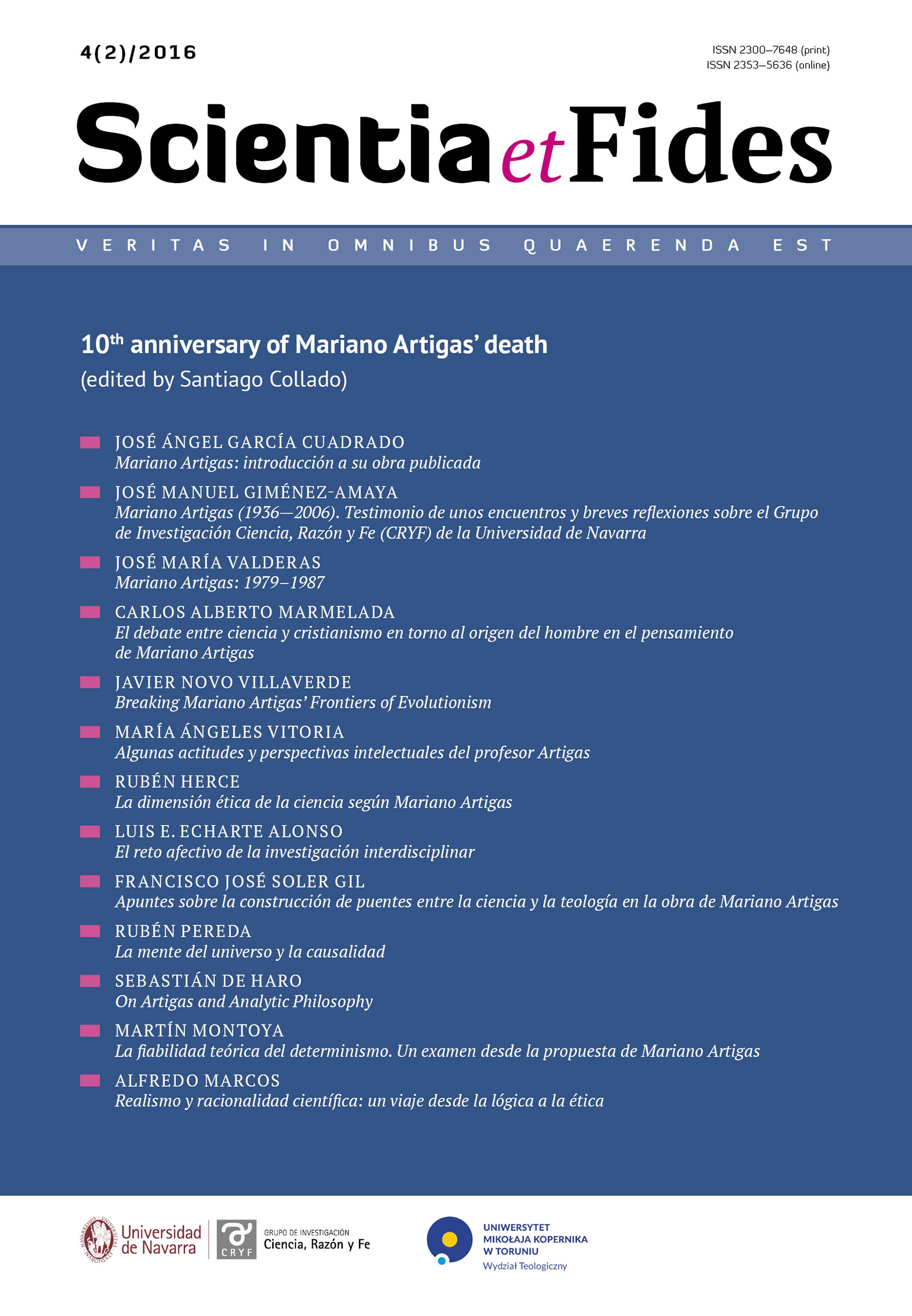On Artigas and Analytic Philosophy
Słowa kluczowe
philosophy of science, Artigas, analytic philosophyAbstrakt
This essay, written on the occasion of the 10th anniversary of Mariano Artigas’s death, examines Artigas’s engagement with analytic philosophy in his philosophy of science. I argue that, overall, Artigas’s project in the philosophy of science is one of—using his own metaphor—‘building bridges’ between distinct areas of knowledge. After reviewing the function of Artigas’s philosophy of science as a bridge between science and philosophy, I analyse how he moved from classical to analytic philosophy. I then assess the extent to which Artigas’s work conforms to reasonable analytic standards of clarity and precision, which can be expected from work in the philosophy of science. I conclude that, while Artigas’s dedication and production were admirable, his work remains essentially unfinished, thus inviting further research that should develop and clarify his conception of science, of its aims, its methods, progress, and of how science leads to knowledge. I attempt to assess Artigas’s philosophy of science from an objective and detached perspective. Thus the essay should be of interest to both scholars in the philosophy of science, as well as to those generally interested in Artigas-scholarship.Bibliografia
Artigas, M. 1963. El problema de la substancialidad de las partículas elementales: estudio sobre la aplicabilidad de la noción de substancia en la microfísica. PhD Dissertation, Lateran University, Rome.
Artigas, M. 1979. La confiabilidad de la ciencia y su impacto filosófico. Doctoral Thesis, Universidad de Barcelona. A summary was published in Barcelona: Ediciones de la Universidad de Barcelona, 1980.
Artigas, M. 1984. Introducción a la filosofía. Pamplona: Eunsa. English translation: Introduction to Philosophy. Manila: Sinag-Tala Publishers, 1990.
Artigas, M. 2001. The Mind of the Universe. Philadelphia and London: Templeton Foundation Press.
Artigas, M. 2006. Knowing Things for Sure. University Press of America.
Artigas, M. and Sanguineti, JJ. 1984. Filosofía de la naturaleza. Pamplona: Eunsa.
De Haro, S. 2013. “Science and Philosophy: A Love-Hate Relationship”. PhilSci 9864. http://philsci-archive.pitt.edu/9864.
Fletcher, S. 2016. “Similarity, Topology, and Physical Significance in Relativity Theory.” British Journal for the Philosophy of Science 67:365-389.
Glock, H.-J. 2008. What is Analytic Philosophy? New York / Cambridge: Cambridge University Press.
Kuhn, T. S. 1962. The Structure of Scientific Revolutions. Chicago: The University of Chicago Press.
Laudan, L. 1978. Progress and Its Problems. Towards a Theory of Scientific Growth. Berkeley / Los Angeles / London: University of California Press.
Maritain, J. 1962. An introduction to Philosophy. London: Sheed and Ward
Ney, A. 2014. Metaphysics. An Introduction. New York / Oxford: Routledge.
Whitehead, A.N. (1978). Process and Reality. An Essay in Cosmology. Gifford lectures delivered in the University of Edinburgh during the session 1927-1928, edited by D. R. Griffin, and D. W. Sherburne. New York: The Free Press.
Pobrania
Opublikowane
Jak cytować
Numer
Dział
Licencja
CC BY ND 4.0. Posiadaczem prawa autorskiego (Licencjodawcą) jest Autor, który na mocy umowy licencyjnej udziela nieodpłatnie prawa do eksploatacji dzieła na polach wskazanych w umowie.
- Licencjodawca udziela Licencjobiorcy licencji niewyłącznej na korzystanie z Utworu/przedmiotu prawa pokrewnego w następujących polach eksploatacji: a) utrwalanie Utworu/przedmiotu prawa pokrewnego; b) reprodukowanie (zwielokrotnienie) Utworu/przedmiotu prawa pokrewnego drukiem i techniką cyfrową (e-book, audiobook); c) wprowadzania do obrotu egzemplarzy zwielokrotnionego Utworu/przedmiotu prawa pokrewnego; d) wprowadzenie Utworu/przedmiotu prawa pokrewnego do pamięci komputera; e) rozpowszechnianie utworu w wersji elektronicznej w formule open access na licencji Creative Commons (CC BY-ND 3.0) poprzez platformę cyfrową Wydawnictwa Naukowego UMK oraz repozytorium UMK.
- Korzystanie przez Licencjobiorcę z utrwalonego Utworu ww. polach nie jest ograniczone czasowo ilościowo i terytorialnie.
- Licencjodawca udziela Licencjobiorcy licencji do Utworu/przedmiotu prawa pokrewnego nieodpłatnie na czas nieokreślony
PEŁEN TEKST UMOWY LICENCYJNEJ >>
Statystyki
Liczba wyświetleń i pobrań: 550
Liczba cytowań: 0



